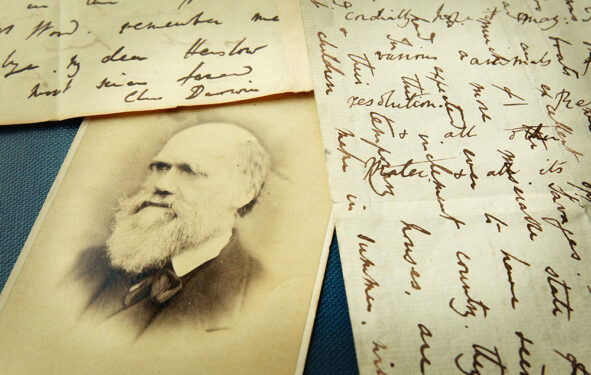
Second in a series
In his insightful and provocative book “Making Sense of Evolution: Darwin, God, and the Drama of Life” (Louisville, Kentucky: Westminster John Knox Press, pp. 163) John Haught argues that if evolution is studied over the billions of years that it has been taking place, what can be discerned is that there is a narrative or story to evolution. He writes the following:
“Without in any way contradicting biology, a theology of evolution may take note, first, that the general drift of life has been in the direction of increasing complexity, consciousness and freedom. And the movement of evolution toward such outcomes has occurred without any suspension of the set of ‘grammatical constraints’ that go by the name of ‘natural selection’. (p. 73)
So Haught is not claiming that we arbitrarily impose an external story onto evolution but rather, without sacrificing any scientific discoveries, a narrative or story can be detected within the evolutionary process. What helps me to understand what Haught sees as a drama that has been going on for billions of years in the evolutionary process is to reflect on evolution the way materialists do. Haught writes the following about the materialists’ interpretation of evolution:
“Unfortunately, contemporary evolutionary materialists have seized Darwin’s rich story of life and bled the drama right out of it. Their mechanistic treatments separate the element of contingency in the life-story from that of predictability, destroying both suspense and coherence. Simultaneously, they turn life’s temporal depth into a rambling series of meaningless moments leading to a final abyss. They typically refer to contingency as “chance,” and to nature’s reliability as “necessity,” both terms signaling for them the ultimate meaninglessness of evolution.”(p.57)
I remember reading a novel many years ago written by someone who was a determinist, an author who did not believe in freedom. The novel was quite dull. Without freedom there can be no excitement, no adventure. This is the world that the materialists present to us, a world bereft of free choices.
Haught has been greatly influenced by the Jesuit paleontologist, Pierre Teilhard de Chardin. In commenting on how we should look on evolution, Haught writes the following paragraph, which I find almost breathtaking:
“What is needed is a more refined kind of ‘seeing,’ as Teilhard emphasized, one that looks to the ‘insideness’ of things. Only a nonanalytical way of experiencing, one that goes beyond mere measurement and quantitative analysis, could ever come in touch with life’s dramatic depth. Beneath the external, mechanical causality that science deals with, there is a narrative cosmological principle operative in the universe as such.
It shapes events not in the manner of an architect or engineer, but of a dramatist who allows the characters to take on lives of their own. Operating in the manner of unrelenting love, this dramatic principle beckons the creation to rise toward the begetting of innumerable states of being, including consciousness and responsibility. Since scientific method looks only to the ‘outside’ of things, the deeply interior domain of life goes unnoticed by the evolutionary grammarian. It is the proper role of theological reading, however, to point readers of nature to the adventurous narrative of love and adventure.”(pp. 77-78)
Neither Teilhard nor John Haught nor I are minimizing the value and importance of science. The point that is being made is that science examines and looks at reality one way and that way is very important, but there are many ways of examining and looking at reality and some of those are as important as science. Unfortunately some people think of science as the way of looking at reality.
As an experiment, ask someone what water really is and accentuate the word “really” and I can guarantee the person will respond ‘H2O”. Of course, from the point of view of positive science it is “H2O’ but from the point of view of philosophy it is a finite being and from the point of view of theology it is a creature of God. The meaning of water depends on the perspective from which we are looking at water. In a chemistry exam if you identify water as a creature of God, you fail. If in a theology exam you identify water as “H20”, you fail. We don’t read a novel as though it was a textbook about chemistry and we don’t read a chemistry textbook as though it is a novel.
What Haught is suggesting is that if we can transcend the narrow materialistic view of evolution presented by some scientists, we will discover new meanings that are just as true and important as the truths discovered by physics, biology, and astronomy. If Haught is correct, and I am confident he is, our view of self, creation and God will be greatly enriched.
Father Lauder is a philosophy professor at St. John’s University, Jamaica. He presents two 15-minute talks from his lecture series on the Catholic Novel, every Tuesday at 9 p.m. on NET-TV.
